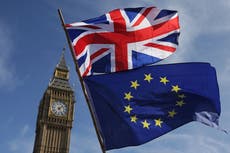Boris Johnson to claim ‘a resolution’ of decades-long clashes with rest of Europe, ahead of Brexit bill vote
Prime minister to say he has achieved something ‘which we were told was impossible’ – before historic legislation passes
Your support helps us to tell the story
From reproductive rights to climate change to Big Tech, The Independent is on the ground when the story is developing. Whether it's investigating the financials of Elon Musk's pro-Trump PAC or producing our latest documentary, 'The A Word', which shines a light on the American women fighting for reproductive rights, we know how important it is to parse out the facts from the messaging.
At such a critical moment in US history, we need reporters on the ground. Your donation allows us to keep sending journalists to speak to both sides of the story.
The Independent is trusted by Americans across the entire political spectrum. And unlike many other quality news outlets, we choose not to lock Americans out of our reporting and analysis with paywalls. We believe quality journalism should be available to everyone, paid for by those who can afford it.
Your support makes all the difference.Boris Johnson will claim to have achieved a “resolution” of decades-long clashes between the UK and the rest of Europe, when MPs back his Brexit trade and security bill in the Commons.
The prime minister will shrug off warnings of huge gaps in the agreement and future battles to come by arguing that it has secured – at record speed – something “which we were told was impossible”.
“Namely, that we could trade and cooperate with our European neighbours on the closest terms of friendship and good will, whilst retaining sovereign control of our laws and our national destiny,” he will tell MPs.
Mr Johnson will also seek to heal wounds by promising to be “the best friend and ally the EU could have”, working “hand in glove” in the years to come
“Those of us who campaigned for Britain to leave the EU never sought a rupture with our closest neighbours,” he will claim, despite the bitter rows and harsh insults since the 2016 referendum.
“We would never wish to rupture ourselves from fellow democracies beneath whose soil lie British war graves in tranquil cemeteries, often tended by local schoolchildren, testament to our shared struggle for freedom and everything we cherish in common.
“What we sought was not a rupture but a resolution, a resolution of the old and vexed question of Britain’s political relations with Europe, which bedevilled our postwar history.”
Mr Johnson will speak at the start of a rapid-fire five-hour debate, which many MPs have protested makes a mockery of trying to scrutinise a 1,254-page document – with the bill itself only published on Tuesday afternoon.
The result is not in doubt, with the hardline Tory European Research Group joining Labour in voting in favour – while the Liberal Democrats announced they would join the Scottish National Party in opposing the deal.
Describing the trade agreement as “threadbare”, the Lib Dem leader, Sir Ed Davey, said: “It is clear that this is a bad deal that will make people's lives poorer, so the Liberal Democrats will vote against it.”
Even before the parliament approves the bill, the prime minister will sign the treaty itself, which will be flown in from Brussels in an RAF plane, accompanied by UK and EU officials.
With amendments possible in the House of Lords – which then have to be overturned in the Commons – it could be Thursday morning before the Queen gives it royal assent.
That would still be in time for the end of the post-Brexit transition period, at 11pm on New Year’s Eve, when the UK will leave the EU single market and customs union.
The agreement points the way to further clashes, because Brussels will be able to impose tariffs, after arbitration, if the UK secures a competitive advantage by weakening labour, consumer or environmental protections.
In his speech, Mr Johnson will make clear his determination to break free of EU rules, saying: “We have nothing to fear if we sometimes choose to do things differently and much to gain from the healthy stimulus of competition.”





Join our commenting forum
Join thought-provoking conversations, follow other Independent readers and see their replies
Comments